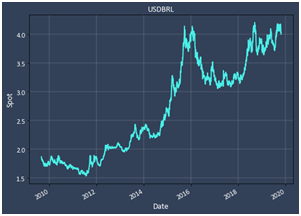
Investment in Brazil is expected to regain momentum in 2020, with the central bank cutting rates for the third time in as many months. With many US investors demanding USD share classes before investing in Brazil and other emerging markets, we look at some of the things you should be aware of before attracting foreign investors.
For Brazilian investment managers (particularly credit and similar yield focused strategies), currency risk or the cost of hedging is one of the principal obstacles faced by managers looking to raise money offshore. As yields remain compressed in the US and Europe, institutional investors continue to look further afield for attractive investments more abundant in emerging markets like Latin America. However, with a diversion into emerging markets, investors are faced with new challenges and can often be put off by a volatile currency. Brazil in the last year has been extremely volatile and slipped against the USD (6.7%).

A fund with a hedged share class would be able to ensure stable returns and save the investors a significant fraction of the potential loss. Nevertheless, a cost-effective hedging solution is crucial to ensure that the high local currency return remains attainable for international investors in USD.
The fact that there is a demand by investors to price out a hedged version of this share class is encouraging but it does add complexities to the fund’s operations and usually, this means more service provider fees. Knowing the costs of hedging and how it will affect the class’s returns can be tricky.
Questions you should ask your providers are:
1. How much are you charging me for execution?
2. How much initial margin will you require for me to place the hedge and what are terms of the variation margin call?
3. Are there any extra roll or administration fees?
4. When is the mark-to-market done?
We've established that the stability and simplicity a foreign share classes offers can be seen by many investors as an attractive feature of a foreign fund. However there are added costs and complexities that can affect the funds performance. It is therefore very useful, to know if your sales team has garnered sufficient interest from serious US based investors before looking into opening a USD share class. Working with a third party to test the waters in a new jurisdiction such as the US is highly recommended.
Deaglo's network was created to help control this process. If you want to learn more about our foreign share class services and how you can leverage our services and network book some time with us using the button below.


